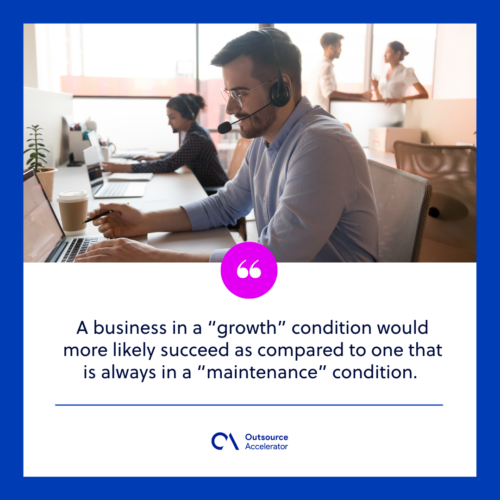Part III: Is now the right time for you to start outsourcing?

- Part III: Is Now the Right Time for You to Start Outsourcing?
After learning about how to begin outsourcing, the next step is knowing the right time to implement it. Recognizing when is the appropriate time would most likely lead to better results than just diving into it haphazardly.
In determining the proper timing, you must be sensitive about that exact point in time when you already need to outsource. How would you do that?
How will you know that you need to outsource your business?
The first thing to do before deciding when to start outsourcing is to make a cost-vs-time analysis for the specific task or tasks you are planning to contract out.
For instance, you want to upgrade one of the software used in your daily operations. There may be two or three of your existing employees that could handle this job, but they would have to work on it after regular office hours.
This situation calls for spending money on overtime pay. Also, it is not certain how many days or weeks it is going to take for them to finish the said upgrade.
Calculate the cost of overtime pay multiplied by an estimated number of days. Do not forget to factor in overtime meals, transportation allowances, and other benefits your company provides for employees who render overtime. Include everything in the final cost.
Compare this value to how much you are going to spend when having to hire a third-party. Keep in mind that you do not have to offer third-party providers the same benefits you give to your employees.
This comparison will help you decide if it is time to outsource or not.
Another way to know that you need to outsource if by figuring out the scale of a specific task or project. One-time projects that are urgent may require hiring a third-party service to finish according to your schedule.
An example of this is if your company is trying to build your website. Some of your team members may know how to do it. But it might take them a considerable amount of time to finish because they cannot leave their main tasks. Outsourcing then becomes the answer.
As also mentioned in the “what is outsourcing jobs definition” part above, outsourcing lets your employees focus more on the work you hired them to do. When their main function is compromised, then it is a clear indication that you already have to outsource.

When is the best time to start outsourcing your business?
Perhaps the apparent time to start outsourcing is when you and your staff are already burned out because of overwork. Moreover, if business operations and profit are already affected by it, then contracting would become a necessity.
You do not have to wait before that happens to begin the process of outsourcing. There are many ways to find out when the right time has come before a business disaster occurs. Below are a few signs that your business already needs outside help.
- You are stressed by so many things that you need to take care of to keep your business running.
- You feel like every day there are not enough hours to complete all your work.
- You feel like you are so busy doing all that you can, in the best way that you can, and still, nothing is moving forward.
- You need more time to relax and unwind because you are already having health issues.
- You have a clear vision for your company and have set specific short-term and long-term goals to achieve them, but you do not know how to accomplish them.
If you are beginning to struggle in managing your company, and cannot find the time for self-growth and business development, then it is indeed time to outsource a few of your tasks.
A business in a “growth” condition would more likely succeed as compared to one that is always in a “maintenance” condition. Make sure your company is always growing by taking advantage of outsourcing.

10 Things that you need to prepare and consider
You now know how to determine if it is time to outsource. You also know the right timing to do it. Next, here are ten things to set up and think through before starting the process.
1. Clear understanding of you and your own team’s workload – As mentioned in Part I of this paper, identifying the roles and responsibilities of both you and your staff is essential before deciding to outsource.
However, it is not just about identifying. It is about having complete awareness of your workload and that of each of your employees as well. Not many business owners even consider this as they are thinking about the financial bottom line most of the time.
You should realize that the employees’ morale is crucial to a company’s success. If you take care of your team members, they would surely take care of your business as well.
2. Identification of project scope and scalability – Identifying the scope and scale of the project you are planning to outsource is essential.
What tasks are needed to be done right now? Are there any that has a prerequisite and could be finished later? Could there be redundant tasks that should not have been included in the project at all?
These are some questions to ask yourself before outsourcing. Realize that some tasks are urgent while others may wait for a later time. You can choose to outsource only the important ones to save money.
Prepare an official written document that identifies the scope and scale of a given project for future reference.
3. Final budget, milestones deadline, and success criteria – The estimated budget and final budget are not the same most of the time. Typically, you allow some excess when approximating. However, you should also not be too stringent and hold back that the budget becomes impractical.
The key is to be realistic when determining the final budget. Further explore and investigate the ways you can generate savings. But be sensible that quality products and services have a cost.
Set realistic deadlines as well. Huge projects take time to complete. Realize that no BPO company could finish a 6-month project in just two months. Check that the agreed deadlines should match the projected workload and final budget.
Lastly, internally agree on a set of success criteria ahead of time. You should present this list to your vendor as well. Make sure they subscribe to it before closing a deal.
4. Shortlist of potential BPO service providers – Search for potential vendors and pare it down to a shortlist of three to four companies. Any more than that would give you a hard time in selecting.
Each BPO company has its benefits and drawbacks. Learn both sides as early as possible to end up with a better decision.
Search online and talk to your business contracts to ask for references. Go the extra mile when it comes to research. You will thank yourself later for the effort.
5. Employee morale and office culture of service provider – When assessing a BPO firm, do not forget to examine its corporate culture and the morale of its employees.
It is usually a good sign when a company’s employees are happy. It only means that the outsourcing firm has done an excellent job keeping their workforce in prime condition for optimum performance. You, as the customer, should be able to benefit a lot from that.
It is a huge risk to hire a third party service provider who does not have a culture to excel and finish tasks on time.
During high-pressure situations, would you be able to rely on them to figure things out by themselves, or they would still have to call you to take care of things? If that is the case, then why did you even bother to outsource?
6. BPO company’s specialization and unique services – It is to choose a vendor that specializes in the task you need to get done than hire one that is more of a generic service provider.
For example, hiring an IT company is the wiser choice if you want to build a website or change an existing software system. You would not want to hire an outsourcing firm that also subcontracts their IT needs to another company.
Also, it would be a plus factor if a vendor could provide additional services that they alone could offer. For instance, aside from providing your required IT support, they could also offer to monitor Key Performance Indicators (KPI) and submit written evaluations according to schedule.
7. Ability to adjust according to you and your customers’ needs – You need to choose a vendor that has initiative. A team that knows how to fix issues by themselves without having to wait for your instructions.
They need to be able to adjust to your customers’ demands as well without compromising the vision that you have for your company.
8. Capacity to appropriately receive and respond to customer calls – With regard to no. 7, phone courtesy should also be a top consideration when selecting your vendor.
A quick call to their office would give you a feel of what it is like for your customers to deal with their personnel. Notice the way they respond to emails as well. Do they sound professional or sloppy?
9. BPO company should have a success manager in place – Choose a vendor that has a success manager who would be specifically assigned to your business alone. This manager would be your go-to person for all things concerning the outsourcing firm.
You do not need to talk to everyone in your chosen service provider’s team when a crisis arrives. You should only be able to reach one all the time. And it is that manager’s job to let the proper persons become aware of the problem.
10. Capability to help in talent acquisition and retention – Expert human resource management would be a bonus.
Outsourcing sometimes requires new hires to work on new tasks presented by a client. Your chosen service provider should be able to recruit their talent without asking for additional payments. They should also be able to keep their team members happy and retain them until their contract with you is done.
Part IV: Outsourcing checklist: What have you accomplished so far?
Creating your own outsourcing checklist is a great way to keep track of your milestones before implementation. It would also help you organize your thoughts while going through the process.
There is also a checklist called “Request for Proposal” or RFP. RFP is a list of the scope of works and responsibilities you want your outsourcer to produce.
Some companies use a pre-made checklist template to send to their potential vendors. Then they would just sit down, wait for the service providers to respond with their proposed price, and choose the lowest. This is a huge mistake.
Preparing your checklist means it is custom-made for the specific needs of your business that you want to deal with. You will then realize that the hours spent in crafting an accurate, well-thought-out checklist will not go to waste after you experience the results.








 Independent
Independent




